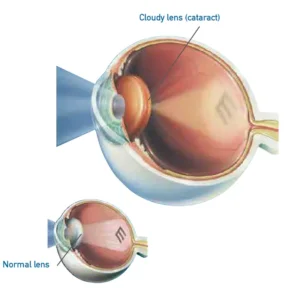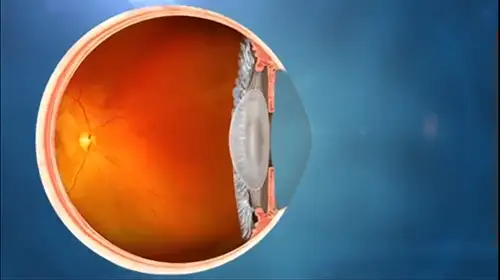Cataract Surgery
Cataracts are caused by the proteins in the eye’s lens breaking down and clumping together. This is part of the ageing process, so it’s normal for older people to develop cataracts.
A cataract is not a growth, but rather a clouding of the normally transparent and flexible lens of the eye. This condition usually develops over some time and interferes with light entering the eye, which affects a person’s ability to see clearly. If left untreated, people with cataracts may eventually go blind. Both eyes may be affected, although not usually to the same extent.
What causes a cataract?
Cataracts are caused by the proteins in the eye’s lens breaking down and clumping together. This is part of the ageing process, so it’s normal for older people to develop cataracts.
Factors that increase the chance of developing cataracts include:
- Age (60+)
- Eye trauma
- Prolonged use of steroids
- Previous inflammation and infection in the eye
- Diabetes
What are the symptoms of cataract?
Cataracts are not painful and often don’t cause noticeable changes in the early stages. As the condition progresses, symptoms can include:
- Blurred, cloudy or dim vision
- Difficulty seeing at night or in low-light situations
- Being sensitive to bright lights and glare
- Seeing halos
- Needing stronger glasses and more frequently
- Colours appearing faded or yellow
- Double vision in the affected eye.
Why do cataracts require surgery?
Cataracts cannot be treated with glasses, contact lenses or refractive surgery like LASIK or SMILE. Treatment of cataract requires surgery on the affected eye to remove the clouded lens and insert a replacement artificial intraocular lens.
If you’ve been told you need cataract surgery, it’s important to be informed on how to proceed.
With almost 250,000 cataract surgeries performed every year in Australia and New Zealand, lens implantation to replace cataracts is a highly common, highly successful procedure.
If you’ve been diagnosed with cataract, and it’s affecting your vision, surgery is a viable option, especially if your glasses don’t seem to be able to fix the problem. While cataracts advance slowly, they can lead to blindness, and it is much preferred to perform surgery early, before the cataract is advanced.
When should you have Cataract Surgery?
Your decision to proceed with surgery will likely depend upon one question, which Dr Versace will always ask:
“Are you bothered enough by your vision now that you would like it to improve?”
If your answer is ‘yes’, it’s time to book your surgery. Cataract surgery requires replacing the eye’s natural lens with an artificial one, made from plastic. The procedure is usually performed under local anaesthetic, in a day surgery specialising in cataract treatment. The procedure is quick and often no sedation or sutures are required.
Along with choosing whether to have cataract surgery, you’ll also need to consider your surgeon, what type of lens to implant and the cost.
While all ophthalmologists are trained in cataract surgery, some specialise in vision restoration, and focus on the results of surgery being no longer needing glasses, rather than simply fixing the cataract. Implanting a multifocal lens, rather than a standard monofocal lens, increases the chance of living spectacle-free following your cataract surgery.
With a variety of ways to perform cataract surgery, there are also a variety of pricing options. In Australia, under Medicare, cataract surgery can be performed in a public hospital, however public patients can experience long wait times and often are not given the option of how the procedure is completed, what implant will be used and who the surgeon is.
Dr Versace performs premium cataract surgery in a private setting, at a time suitable to you. While Medicare and Private Health Insurance contribute to the cost, there is often an out-of-pocket expense, which, if applicable, will be documented prior to your surgery.
What to expect from your initial consultation initial consultation
Your first appointment with a specialist cataract surgeon will take 1 to 2 hours and involves:
- A thorough eye exam to assess your suitability for surgery
- A discussion about which replacement lens best suits your needs, as well as the benefits and risks of surgery
- Scheduling your surgery. Cataracts are generally not removed at the same time – the operations are performed around two weeks apart to help with the recovery process
- Providing detailed costs for the procedure, including any out-of-pocket costs not covered by Medicare and private health insurance. It is strongly advised that you bring a referral from your GP or optometrist to:
– Inform your surgeon of your visual symptoms
– Enable you to claim part of your fees as a rebate from Medicare and/or private health insurance (depending on your level of cover).
Cataract Surgery Aftercare
Usually taking only 15 minutes, and performed under local anaesthetic – administered by eye drops – most patients experience rapid visual recovery.
Complications following cataract surgery are rare, however when experienced, they must be attended to immediately.
Cataract surgery aftercare begins immediately following your cataract surgery, when Dr Versace places a clear, plastic shield over the eye to protect it. While you’re able to see, your vision will not be clear until the next day. Many patients experience mild irritation following cataract surgery, including the eye being ‘watery’, ‘scratchy’ or ‘warm’. Paracetamol is recommended, and if discomfort is anything more than mild, or pain persists with paracetamol, you should consult your doctor.
Directly following your eye surgery, it is important to rest. While not necessary, we recommend keeping the eyes closed for the first few hours, however gentle movement, like walking, is acceptable.
If anaesthetic drops are used, you’ll notice immediate vision following your surgery, however it won’t be clear. If it remains unclear after 24 hours, it is important to consider what other issues may be affecting your vision. If you notice increasing redness, pain or loss of vision, contact your doctor immediately.
Most patients experience a smooth recovery from cataract surgery. The plastic shield can be removed the next day, however some people prefer to continue to apply it at night, to protect from inadvertent eye-rubbing.
Dry Eye is a common side effect, and lubricating eye drops are recommended. If a monofocal lens has been used and you require glasses, these can be prescribed usually two weeks after surgery, when healing is stable. During this time you can continue to wear previous or temporary reading glasses, until you’re ready to visit your optometrist.
At around three months after surgery 20 percent of patients will need laser treatment – YAG laser capsulotomy – to clear scar tissue from behind the lens implant. This is a fast, painless, one-time procedure that will sharpen vision.
While it is impossible for a cataract to come back, we stay in touch with all our patients to ensure they’re satisfied with their surgery outcome and enjoying their corrected vision. Rarely, further surgery may be needed to adjust or change the implanted lens, but in the vast majority of cases, patients simply return to their optometrist for their usual ongoing eye care.

Dr Patrick Versace
Ophthalmic Surgeon
With over 30 years’ experience in Ophthalmology, Dr Versace is a leader in ophthalmic surgery in Sydney, Australia. Specialising in cataract and refractive surgery, Dr Versace uses a personalised, empathetic approach, recognising each patient is unique. Dr Versace is committed to using the most technologically advanced techniques to ensure the best possible patient experience and outcomes.


